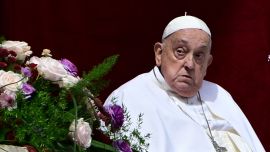Peru’s Finance Minister Pedro Francke was given assurances from the new government that he’ll be able to implement his economic programme, he said in the first interview since securing his new role.
Francke, a former World Bank economist, was sworn in late Friday, a day when markets crashed amid investor concern that he wouldn’t take the post due to differences with other members of the Cabinet appointed by President Pedro Castillo. These included Guido Bellido, a lawmaker who considers the communist government of Cuba to be a democracy, as prime minister.
“It seemed essential to me to have full support for the economic policy that we had proposed,” Francke said Sunday evening in the interview, adding that he hadn’t had much contact with Bellido previously. “Fortunately, that has already been resolved and it seems to me that it gives us space to develop our economic line in a completely safe way.”
Bellido tweeted his support for Francke’s policies Friday night before he was sworn-in.
For investors, Francke offers a counterbalance, and a reappointment of Julio Velarde, the Central Bank president since 2006, would help preserve a sense of continuity for markets. The two have already spoken and another call is set for Monday, he said, to arrange a meeting to discuss coordination between economic and monetary policy. Bonds snapped a nine-day losing streak in early trading.
“We are convinced that it’s necessary to act with fiscal responsibility” and keep debt “at a prudent level,” Francke said. “The most important thing is to ensure that there is coordination between economic policy and monetary policy,” he said, adding that that’s the objective of his meeting with Velarde.
Worst performer
Investors are in need of some reassurance due to concerns over Castillo’s policy objectives and the influence of his Marxist Peru Libre party on governance. Peru’s stock market is the world’s worst performer this year, and the sol’s slump was deeper than that of any other currency last month, according to data compiled by Bloomberg.
Peruvian dollar bonds were among the best performers in emerging markets Monday, following Francke’s appointment. Bonds due in 2060 rose 1.5 cents to trade at 87.8 cents on the dollar, while the cost to insure the country’s debt against default headed for its biggest daily drop since June 9. The sol strengthened 0.5 percent to 4.04 per dollar and stocks gained 2.2 percent.
With Francke heading the Finance Ministry, “it will be more difficult for Castillo to implement his more communist policies,” Citigroup strategists including Dirk Willer and Ernesto Revilla wrote in a note Monday. “That said, uncertainty is still high, frictions between Congress and Castillo are likely to continue, and we think this could weigh on assets after the initial reaction.”
Castillo, a former schoolteacher and union leader, emerged out of relative obscurity this year to win the presidency after consolidating support from Peru’s left-wing. He’s vowed to spend much more on education and health while seeking greater tax revenue from mining operations. He also wants to rewrite the constitution.
Francke, who’s tasked with reviving an economy battered by recession and the world’s worst Covid-19 death rate, said the country will invest heavily in healthcare.
“Tax collection has come at a good speed, growing at a good pace,” he said. “There is room to have a little more spending.”
Mining tax
He also said there are plans to announce more tax measures shortly, including a levy on mining.
During the campaign, Francke advised Castillo on the economy and vowed to largely maintain the country’s macro-economic policies while putting more focus on social issues.
Francke is popular with investors, having called for inflation-targeting, fiscal prudence and respect for private property. His appointment helps ease the concerns stoked by Castillo’s inaugural address last week, in which the president called for Peru to retake “sovereignty” of its natural resources.
“What we want to do is not nationalisation, it does not refer to that, it refers to the need to guarantee that mining income, the value of those natural resources, is distributed fairly so that the state has resources to improve health and education,” Francke said.
related news
by María Cervantes, Bloomberg






















Comments